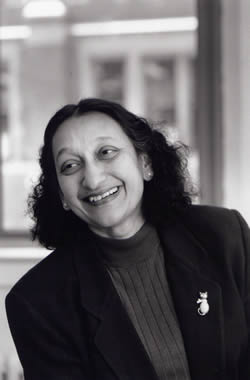Equity Campaign Announces New Assessment and Evaluation Research Initiative
The Campaign for Educational Equity, launched at Teachers College in 2005 to help narrow the gap between the nation's most advantaged and disadvantaged students, will now evaluate school-based efforts outside the College that have that same goal.
The new effort in The Campaign, called the Assessment and Evaluation Research Initiative (AERI), will be co-directed by two Teachers College faculty members: Madhabi Chatterji, Associate Professor of Measurement, Evaluation, and Education; and Edmund W. Gordon, the Richard March Hoe Professor, Emeritus of Psychology and Education and Director of the Institute of Urban and Minority Education.
AERI will begin with the evaluation and assessment of two major projects. AERI will evaluate a comprehensive early intervention and school readiness program called the Chemung County School Readiness Project located in Elmira, NY. This innovative project brings several public and community-based organizations together to provide coordinated comprehensive services in early educational intervention and family care to children from birth to Kindergarten in a community that has long been suffering from high dropout rates. In addition, AERI will assess a program in East Ramapo, New York, which uses a unique teacher-training model aimed at reducing achievement gaps.
"The positions of The Campaign on what works best in creating effective schools are always research-based, but with AERI, The Campaign will now have the capability to conduct its own assessment and evaluation research," said Michael A. Rebell, Executive Director of The Campaign for Educational Equity, in announcing the new initiative.
"The purpose of AERI is to support The Campaign with a comprehensive program of research in assessment and evaluation that will meaningfully inform policy and practice, with a particular emphasis on educational excellence and equity," said Chatterji, who will be leading the research on both the Chemung County and East Ramapo projects.
Chatterji, a nationally-recognized expert on assessment and evaluation methodologies, has recommended the use of mixed methodologies -- combining randomized experiments with descriptive and qualitative methods-- in evaluating the effectiveness of school-based programs or interventions. Her views stand in contrast to the U.S. Department of Education's preference to use randomized field trials only for measuring effects, as found in the federal No Child Left Behind Act.
Several research and evaluation studies of the Chemung County School Readiness Project are expected following the first planning meeting with stakeholders in late July, looking at both long- and short-term effects. In addition, AERI is developing and conducting research on a dynamic classroom assessment program, being delivered by teachers in East Ramapo, New York, that attempts to close learner gaps in mathematics with diagnostic assessments and learner-mediation.
The Campaign for Educational Equity takes a comprehensive approach to educational equity, rooted in the belief that because educational inequity poses a multi-faceted challenge, any response must be equally comprehensive. In addition to widely-studied educational interventions like early childhood education, small class sizes and high-quality teaching, The Campaign advocates for investments in parental involvement, children's health and other factors that affect student performance.
"By adding AERI, we are furthering the Campaign's commitment to comprehensive educational equity," said Rebell.
Published Friday, Jul. 21, 2006
